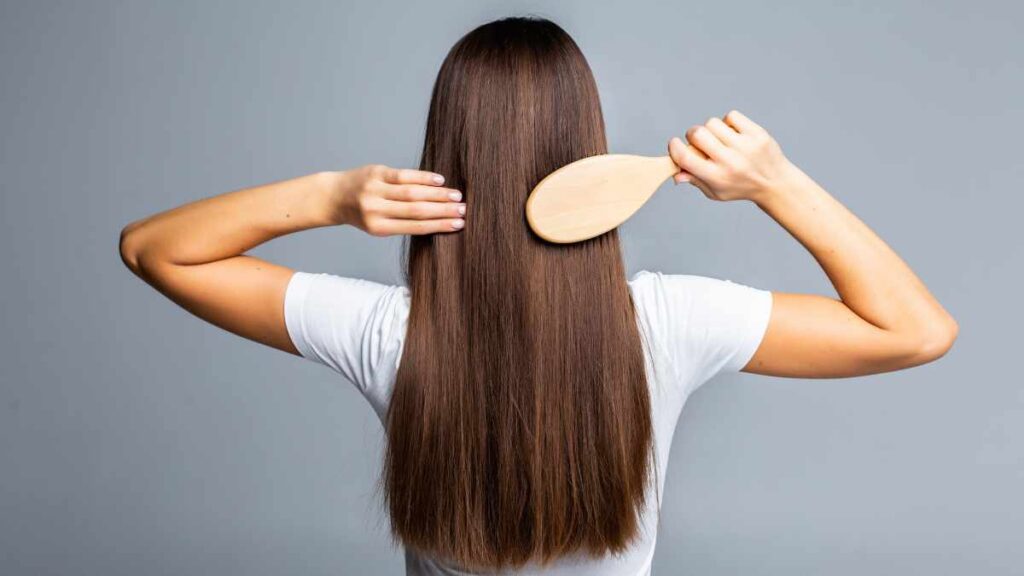Achieving long, healthy hair is a dream for many, but environmental factors and poor nutrition can often hinder hair growth. While various hair care products promise quick results, sustainable hair health begins from within. According to the American Academy of Dermatology, an average person has 100,000 hair follicles on their scalp, and losing 50-100 hairs daily is normal. However, if your diet lacks the essential nutrients, hair loss, thinning, and dryness can occur. To help strengthen hair follicles and boost hair growth, focus on eating nutrient-rich foods.
1. Protein: The Building Block of Hair
Did you know that keratin, the protein your hair is made of, constitutes 95% of your hair? Without an adequate protein intake, hair growth can slow down, leading to weak and thinning hair.
Best sources of protein:
- Eggs
- Milk
- Lean meat
- Nuts (like almonds and walnuts)
- Legumes (such as lentils and beans)
- Yogurt
- Paneer
Tip: Include protein-rich foods in every meal to promote optimal hair growth.
2. Iron: Prevent Hair Loss
Iron plays a critical role in carrying oxygen to your hair follicles. Iron deficiency is a leading cause of hair loss and can lead to anemia, slowing down hair growth.
Iron-rich foods:
- Spinach and other green leafy vegetables
- Eggs
- Meat (particularly red meat)
- Poultry
- Guava (an excellent plant-based source)
Tip: Pair iron-rich foods with vitamin C (e.g., citrus fruits) to enhance absorption.
3. Omega-3 Fatty Acids: Combat Dry Scalp
A dry scalp can hinder hair development. Omega-3 fatty acids naturally help maintain a hydrated scalp, promoting healthy hair growth and shine.
Top sources of Omega-3 fatty acids:
- Walnuts
- Soybeans
- Salmon
- Flax seeds
- Tuna
- Cauliflower
Tip: Aim to include omega-3-rich foods in your diet twice a week to support scalp health.
4. Zinc: Strengthen Hair Follicles
Zinc is essential for the growth of healthy hair and the maintenance of oil glands that surround the follicles. A deficiency in zinc can block nutrients from reaching your hair roots, leading to hair thinning and dandruff.
Zinc-rich foods:
- Pumpkin seeds
- Spinach
- Whole grains
- Peanuts
- Sunflower seeds
Tip: Incorporate zinc into your daily meals to ensure balanced scalp health.
5. Biotin: Stimulate Hair Follicle Growth
Biotin, a B-vitamin, is critical for the production of keratin, helping stimulate hair growth. It also enhances the circulation of red blood cells, which transport oxygen and nutrients to the scalp.
Biotin-rich foods:
- Lentils
- Almonds
- Walnuts
- Cauliflower
- Green leafy vegetables
- Chicken and fish
- Egg yolk
- Mushrooms
Tip: For optimal biotin absorption, focus on combining biotin-rich foods with other B vitamins (B6, B12, folic acid).
6. Vitamin C: Boost Iron Absorption and Fight Aging
Vitamin C is crucial for iron absorption and helps protect your hair from oxidative stress. It also promotes the production of collagen, a protein that maintains hair structure.
Vitamin C-rich foods:
- Bell peppers
- Kale
- Guava
- Citrus fruits (like oranges and lemons)
- Strawberries
Tip: Include vitamin C in your diet to protect your hair from damage and premature greying.
7. Vitamin A & E: Nourish Your Hair and Scalp
- Vitamin A: Promotes sebum production, moisturizing the scalp. A deficiency can lead to dry, flaky scalp and hair loss.
- Vitamin E: Protects hair from UV damage and oxidative stress. It also helps lock in natural oils, promoting a healthy scalp.
Vitamin A & E-rich foods:
- Carrots
- Sweet potatoes
- Avocados
- Eggs
- Milk
- Sunflower seeds
Tip: Combine foods high in both vitamins A and E to ensure maximum nourishment for your scalp.
Conclusion: A Balanced Diet for Healthier Hair
Achieving long and healthy hair requires a combination of good nutrition and proper hair care. By incorporating these 7 essential nutrients into your diet, you can improve hair strength, prevent hair loss, and promote overall hair health.
Actionable Tips for Hair Health:
- Focus on a balanced diet rich in protein, iron, and essential vitamins.
- Pair nutrients like iron and vitamin C to improve absorption.
- Regularly trim your hair to maintain its health.
FAQs:
Q: Can I reverse hair thinning with nutrition alone?
A: While a balanced diet can significantly improve hair health, addressing the root causes of hair thinning (stress, hormonal imbalances, etc.) is essential. Consult a dermatologist if hair thinning persists.
Q: How long will it take to see results from improving my diet?
A: It may take 2-3 months to see visible improvements in hair growth and texture, as hair follicles need time to adjust and grow.
